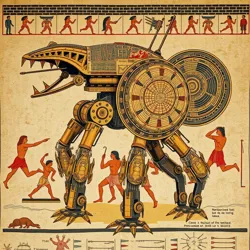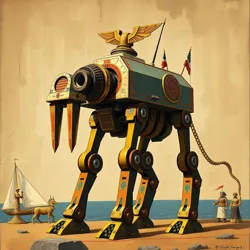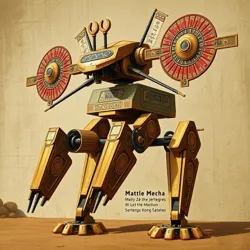Minoan Battle Mecha
The Minoan Battle Mecha were sophisticated mechanical warriors developed by the Cretan Engineering Guilds during the height of Minoan civilization (2700-1450 BCE). These bronze and crystal-powered constructs stood approximately 30 feet tall and represented the pinnacle of Bronze Age Mechanical Engineering.
 Recently restored palace fresco showing a Battle Mecha defending the port of Knossos
Recently restored palace fresco showing a Battle Mecha defending the port of KnossosDesign and Technology
The Minoan Battle Mecha utilized a unique combination of Aegean Crystal Technology and sophisticated bronze metallurgy. Their most distinctive feature was the Labyrinthine Core, a complex mechanical system that mimicked the famous architectural patterns of Minoan palaces.
Key technological features included:
-
Crystalline power matrix derived from deep-sea minerals
-
Hydraulic movement systems using sacred spring water
-
Bull-horn resonance chambers for sonic attacks
-
Advanced gyroscopic stabilization for earthquake resistance
Cultural Significance
The Battle Mecha played a central role in Minoan religious and military life. Each machine was consecrated to the Snake Goddess and required ritual maintenance by specialized priest-engineers. The machines were particularly active during the Bull-Leaping Festivals, where they served as both ceremonial guardians and emergency safety systems.
 Technical diagram showing the intricate Labyrinthine Core mechanism
Technical diagram showing the intricate Labyrinthine Core mechanismCombat Capabilities
Minoan Battle Mecha were primarily defensive weapons, designed to protect the island's ports and palaces. Their arsenal included:
-
Retractable bronze blades infused with Volcanic Glass
-
Thalassocratic Shield Arrays for naval combat
-
Multiple independently-targeting optical sensors
-
Emergency submarine transformation capabilities
Historical Impact
The sudden disappearance of the Minoan Battle Mecha coincided with the mysterious collapse of Minoan civilization around 1450 BCE. Some scholars attribute their destruction to the Great Thera Eruption, while others suggest they were deliberately deactivated to prevent them from falling into rival hands.
 Sacred symbols found on recovered Battle Mecha components
Sacred symbols found on recovered Battle Mecha componentsSee Also
- Crystal-Powered Ancient Weapons
- Minoan Military Technology
- Sacred Engineering Traditions
References
- Aegean Mechanical Chronicles
- Minoan Technical Manuscripts
- Bronze Age Warriors: A Mechanical History